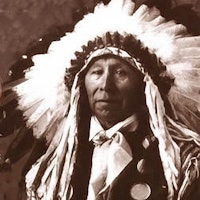Make me always ready to come to you with clean hands and straight eyes, so when life fades as the fading sunset, my spirit may come to you without shame.
Chief Yellow Lark

Let Me Walk in Beauty
Topic: Virtue, Morality, & Ethics
O Great Spirit,
whose voice I hear in the winds
and whose breath gives life to all the world,
hear me.
I am small and weak.
I need your strength and wisdom.Let me walk in beauty
and let my eyes ever behold the red and purple sunset.
Make my hands respect the things you have made
and my ears grow sharp to hear your voice.Make me wise so that I may understand the things
you have taught my people.
Let me learn the lessons you have hidden
in every leaf and rock.
I seek strength not to be greater than my brother or sister
but to fight my greatest enemy, myself.
Make me always ready
to come to you with clean hands and straight eyes
so when life fades as the fading sunset
my spirit may come to you without shame.
Chief Yellow Lark, born sometime in the 1850s, was a revered leader of the Lakota Sioux tribe. The exact date and location of his birth are unknown, however it is known that Yellow Lark was able to translate Lakota prayers into English during a period when few Lakotas were proficient in the English language. This linguistic proficiency, coupled with his evident wisdom, suggests a deep cultural immersion and a keen understanding of both Lakota traditions and the encroaching Western world.
Yellow Lark was a man profoundly touched by the struggles of his people. He witnessed the ongoing disruption of his people's way of life, marked by death, displacement, and the forceful appropriation of the Lakota's ancestral lands. Amidst these challenging times, Yellow Lark nurtured a vision of peace that was deeply rooted in his Lakota heritage. He longed for a world where Native Americans and newcomers alike could coexist harmoniously, honoring their respective cultures and traditions. This vision inspired his interpretation of the Great Spirit Prayer, a spiritual message that embodied the chief's profound wish for unity and peace.
Yellow Lark's interpretation of the Great Spirit Prayer is a testament to his enduring hope, a beacon of light amidst the tumultuous times of his era. His life's work serves as a poignant reminder of our shared humanity and the universal longing for peace and love. As we recount Yellow Lark's life, we are reminded of the profound wisdom present in the traditions of the Lakota Sioux and all indigenous cultures, wisdom that continues to guide us towards peace, understanding, and mutual respect.
Let Me Walk in Beauty
Yellow Lark,Chief [Easwaran, Eknath. God Makes the Rivers to Flow: an Anthology of the World's Sacred Poetry & Prose. Nilgiri Press, 2009, p. 188 (Chief Yellow Lark, Let Me Walk in Beauty)].

Chief Yellow Lark
Theme: Virtue Is

The Great Spirit prayer [shorter commentary]
The Great Spirit prayer [longer commentary]
Resources
Related Quotes
Copyright © 2017 – 2026 LuminaryQuotes.com About Us